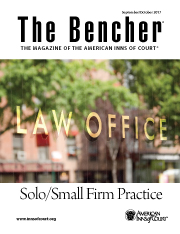The Benefits and Challenges of Our Solo and Small Firm Practices
The Bencher—September/October 2017
By Julie E. Bates, Esquire
 “The best thing about my solo practice is that every year I’m Attorney of the Year,” my husband has often joked.
“The best thing about my solo practice is that every year I’m Attorney of the Year,” my husband has often joked.
After graduating from law school, he hung out a shingle in his hometown and never looked back. However, my path as an attorney took a much different route: I went from a large firm to a small one, and later to solo practice. I worked five years at a downtown high-rise firm until a recession resulted in 15 lawyers, including me, being laid off. At the time, I was four months pregnant. Try finding a new job in that condition!
An interesting thing happened, though. After our son was born, I was surprised to discover my love for being a stay-at-home mom, despite the financial challenges of morphing from a double-income-no-kids couple (“Dinks” for those who remember) into a family with one income.
After a year at home, I began working part-time for a small firm. It was legal heaven. I loved getting back into law and enjoyed great working relationships with the five full-time attorneys who composed the rest of the firm.
With the birth of our second son, I again changed my game plan, and—with the support of my amazing husband—I returned to both 24/7 mommy-ing and a tight one-income budget, this time with a family of four. Challenge accepted.
When our sons were in first and fourth grades, I began a solo, part-time practice from my “home office” (a.k.a. my desk in the kitchen). I intended to work only hours that matched the school calendar. That plan didn’t go as smoothly as I’d hoped, but it was a good fit for me. I didn’t take on litigation-driven cases where my time wouldn’t be my own. I was able to plan and schedule most of my legal work around summer, Christmas, and other school breaks. When that wasn’t possible, I made play-date arrangements for the boys until they were old enough to become interested in what I did, and wanted to come with me.
However, what was best for my family isn’t for everyone. We made choices that, for the most part, worked well for us, but I don’t want to imply that we lived a rosy, carefree existence. Benefits and challenges drive the continuing struggle of work–life balance for most lawyers, regardless of the size and scope of their practice.
For my husband and me, the benefit of our solo and small-firm practices was the flexibility of our time. Among other things, we could usually control our schedules so that one or both of us were able to attend our children’s ball games, plays, other school events, and Scouting activities.
Our constant challenge was money. When I stayed home full-time, and when I worked part-time as our kids were growing up, our income wasn’t nearly what it had been as young lawyers. The reduction in finances meant that instead of delegating jobs to a staff, we were our own janitors, I.T. department, accountants, and—well, you get the picture. Living on a greatly reduced income required re-thinking the financial comforts that we, as Dinks, had envisioned. The money pinch felt terribly difficult at the time, yet now we rarely think about it. Really.
Fast forward to 2017. Even though our children have flown the nest, I continue to lawyer only on a part-time basis, and devote other waking hours to matters near and dear to my heart, including the Ruth Bader Ginsburg American Inn of Court.
Somewhere along the way of my ever-changing work situation, my mother, Gloria Bates, convinced me to help her start a new Inn in Oklahoma City. It became more work—and more fun—than we ever anticipated. Mom started law school in her forties; upon graduation, she clerked for a federal judge, then went into practice with her former law school classmate, who happened to be my husband! She later became a judge herself. Now retired, she considers founding the Inn to be her greatest contribution to our legal community.
I’m glad I made time in my life for the Inn. My membership has resulted in a benefit that I never imagined years ago. In suburban solo practice, I felt somewhat secluded from interactions with other lawyers and judges. Participating in the Inn kept me in regular contact with the bench and bar, and continued to widen my circle of legal friendships, thereby enriching my professional life experiences.
Nothing has been more fulfilling in my legal career than the comradeship of working side-by-side with fellow Inn members in efforts to better our profession. And by doing just that, each member of an American Inn of Court is truly “Attorney of the Year.”
Julie E. Bates, Esquire, practices law in Oklahoma City, Oklahoma. She is an Emeritus member and co-founder of the Ruth Bader Ginsburg AIC.
© 2017 Julie E. Bates, Esq. This article was originally published in the September/October 2017 issue of The Bencher,
a bi-monthly publication of the American Inns of Court. This article,
in full or in part, may not be copied, reprinted, distributed, or stored
electronically in any form without the express written consent of the American Inns of Court.